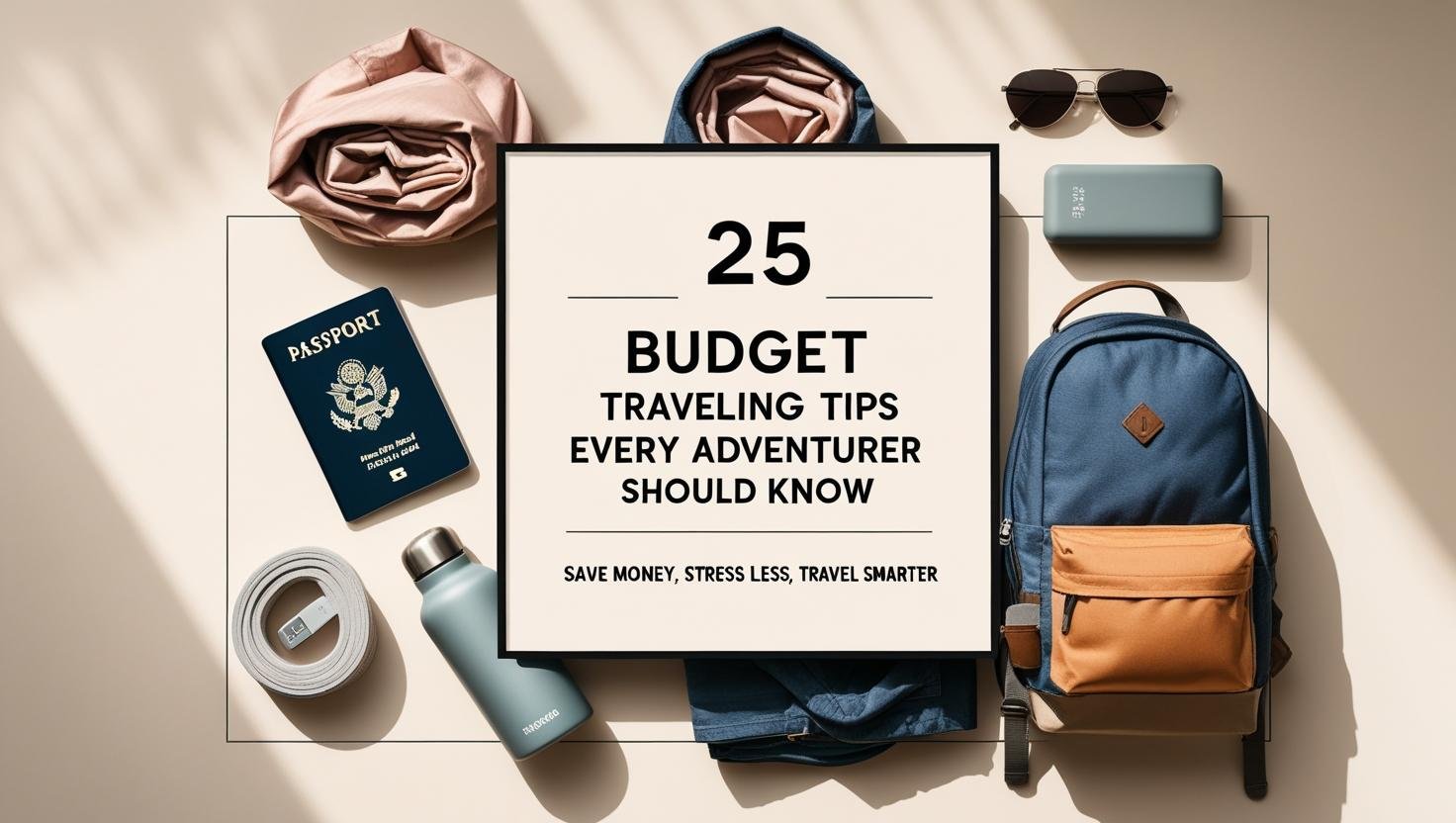Traveling is one of life’s greatest joys—but let’s be real, it can also drain your wallet faster than you expect. If you’ve ever returned from a trip wondering where all your money went, you’re not alone. The good news? Budget travel isn’t about being cheap or missing out—it’s about being smart, intentional, and knowing the right hacks.
Today, I’m sharing my 25 best budget traveling tips that I’ve learned through years of adventures (and mistakes 😅). These aren’t the generic “stay in hostels” tips you’ve already heard a thousand times—these are real strategies, practical hacks, and tested tricks that can save you hundreds (sometimes thousands) of dollars without sacrificing fun.
Ready? Let’s dive in.
✈️ Flights & Transportation Hacks
1. Use Flight Comparison Tools—but Don’t Trust Just One
Sites like Skyscanner, Google Flights, and Momondo each pull different fares. I always check at least two, then book directly through the airline to avoid hidden fees.
2. Be Flexible with Dates & Airports
Flying on Tuesdays and Wednesdays almost always saves money. And if you can land in a nearby airport (like flying into Milan instead of Venice), you can save big on international routes.
3. Travel Overnight to Save on Accommodation
Night buses and trains are a double win: cheap transportation + one less hotel night to pay for.
4. Always Clear Cookies or Use Incognito Mode
Airline websites track your searches and sometimes raise prices. Incognito browsing helps you see true fares.
5. Consider Budget Airlines, but Pack Smart
Budget airlines like Ryanair or Spirit can be lifesavers—but only if you travel light. One carry-on (packed minimalist style) keeps your flight under $50.
🏨 Accommodation & Stay Tips
6. Stay Outside City Centers
You’ll pay 30–50% less for accommodation just by staying 15–20 minutes outside the main tourist hub. Public transport makes it easy to get in.
7. House-Sitting = Free Stays
Sites like TrustedHousesitters let you watch pets or homes in exchange for accommodation. It’s a hidden gem for slow travelers.
8. Try Hostels with Private Rooms
Hostels aren’t always about bunk beds and loud roommates. Many now offer affordable private rooms—cheaper than hotels, but more comfortable than dorms.
9. Airbnb Long-Term Discounts
Booking for a week or a month often unlocks massive discounts. Perfect for digital nomads or longer trips.
10. Couchsurfing Isn’t Dead (Yet)
Yes, it’s old-school, but Couchsurfing can still work if you’re open to cultural exchange. Always read reviews carefully for safety.
🍲 Food & Eating Hacks
11. Eat Where the Locals Eat, Not Where the Tourists Sit
Skip the restaurants with English menus out front. Walk a few blocks away from tourist attractions, and prices drop instantly.
12. Street Food Is Your Best Friend
From Bangkok night markets to Mexico City tacos, street food is cheap, authentic, and delicious. Just look for the stalls with the longest local lines.
13. Grocery Stores > Restaurants
One of my favorite hacks: pick up bread, cheese, fruit, and snacks from a supermarket. Instant picnic, way cheaper than dining out.
14. Cook at Least One Meal a Day
If your hostel, Airbnb, or hotel has a kitchenette—use it. Even just making breakfast saves $10–15 daily.
15. Bring a Reusable Water Bottle & Filter
Buying bottled water every day adds up fast. A reusable bottle with a portable filter (like LifeStraw) pays for itself within days.
🎒 Activities & Experiences
16. Free Walking Tours Are Gold
Almost every major city has a “free walking tour.” They’re tip-based, full of local insights, and perfect for solo travelers.
17. Check Museum Free Days
Many museums (like The Louvre in Paris or MoMA in New York) have free admission days each month. Plan your itinerary around them.
18. Explore Nature (It’s Almost Always Free)
Beaches, hikes, waterfalls, and public parks are not only free but often more memorable than pricey attractions.
19. Use City Passes Only If You’ll Use Them
Tourist passes can be great—but only if you actually plan to visit 3–4 of the included attractions. Otherwise, they’re a waste of money.
20. Follow Local Events Calendars
Cities often host free festivals, concerts, or cultural events. A quick Google search like “free events in [city] this weekend” works wonders.
💸 Money & Safety Hacks
21. Use No-Fee Travel Credit Cards
Foreign transaction fees (3% per purchase) add up quickly. Cards like Chase Sapphire or Capital One Venture save you money.
22. Withdraw Cash in Bulk
Instead of multiple small withdrawals (with multiple ATM fees), take out larger amounts once. Store most of it safely in a money belt or hidden pouch.
23. Always Have a Backup Card
Lost or blocked cards can ruin a trip. Keep a second one in your backpack, separate from your main wallet.
24. Learn Basic Local Phrases
Saying “hello,” “thank you,” and “how much” in the local language builds trust and sometimes even leads to discounts.
25. Travel Insurance Is a Must
It feels like an unnecessary cost—until you need it. Medical emergencies or lost luggage can cost thousands otherwise.
🙋 FAQ: Budget Traveling Tips
What is the number one rule of budget travel?
Flexibility. If you can be flexible with dates, destinations, and accommodations, you’ll always find cheaper options.
Are budget airlines safe?
Yes, budget airlines are generally safe. The key is reading the fine print for baggage and boarding fees so you don’t get surprised.
How can I save money on accommodation while traveling solo?
Try hostels, house-sitting, or staying just outside the city center. Also, check platforms like Couchsurfing for free stays.
What’s the cheapest way to eat while traveling?
Street food, grocery store meals, and cooking at least one meal per day. Eating like a local always costs less.
Is travel insurance worth it for budget travelers?
Absolutely. One emergency could wipe out all your savings. A small upfront cost can save you thousands.
How do I find free activities in a new city?
Look up free walking tours, check museum free days, and search “free events in [city] this weekend” before you arrive.
How much money should I set aside for emergencies while traveling?
At least $200–$500 in an easily accessible account. Always have a backup card, too.
Can I travel the world with just a carry-on bag?
Yes! Minimalist packing saves airline fees and stress. Rolling clothes, using packing cubes, and choosing versatile outfits are key.
What’s the best way to book cheap flights?
Use multiple flight comparison tools, be flexible with dates, and consider budget airlines with only a carry-on.
Is it possible to travel on a budget with kids?
Yes, but it requires planning. Look for family discounts, free parks, and cook meals instead of eating out.
How do I avoid hidden travel costs?
Research baggage fees, check ATM charges, and always read the fine print for tours and accommodation.
Are budget hostels safe for women?
Yes, especially those with female-only dorms. Always read reviews and trust your instincts.
How can I stretch a small budget for longer trips?
Slow travel is key. Spending more time in one place reduces transport costs and often leads to discounts on accommodation.
What are the cheapest countries to travel in 2025?
Vietnam, Thailand, Mexico, Albania, and Colombia are budget-friendly favorites with rich culture and low costs.
Can I travel on a budget and still be eco-friendly?
Definitely. Reusable bottles, local public transport, and minimalist packing reduce both costs and your footprint.
🌟 Final Thoughts
Budget travel isn’t about denying yourself—it’s about spending smarter so you can travel longer, deeper, and with less stress. When you cut costs on the things that don’t matter (like overpriced flights or tourist traps), you free up money for what does matter: experiences, connections, and memories.
Remember: every dollar you save is another day you can stay on the road. ✈️🌍
So pack light, stay flexible, and keep these 25 tips in your back pocket. They’ll save you money, time, and a whole lot of stress—guaranteed.











